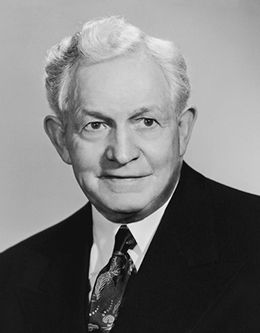It is evident, then, that true religious training must include instruction in relation to God and to his laws and government and also in relation to man’s duty to man.
The Brigham Young University is primarily a religious institution. It was established for the sole purpose of associating with facts of science, art, literature, and philosophy the truths of the gospel of Jesus Christ. Even more specifically, its purpose is to teach the gospel as it has been revealed in this age to the Prophet Joseph Smith and other leaders who have succeeded him. The ideal that should impregnate all university instruction was tersely designated by President Brigham Young when he said to Brother Karl G. Maeser: “Brother Maeser, I want you to remember that you ought not to teach even the alphabet or the multiplication tables without the Spirit of God. That is all. God bless you. Good-bye.”¹
Emphasis on the need of religious education was again given in the year 1888 when the Church added to the parent institution the present system of Church education in order, as was stated, “that we should have schools where the Bible, the Book of Mormon and the Book of Doctrine and Covenants can be used as text books, and where the principles of our religion may form a part of the teaching of the schools.”²
In making religion its paramount objective, the university touches the very heart of all true progress. By so doing it declares with Ruskin that “anything which makes religion its second object, makes religion no object. . . . He who offers God a second place, offers him no place.”³ It believes that “by living according to the rules of religion, [a man] becomes the wisest, the best and happiest creature, that he is capable of being.”⁴
I emphasize religion because the Church university offers more than mere theological instruction. Theology as a science “treats of the existence, character, and attributes of God,”⁵ and theological training may consist merely of intellectual study. Religion is subjective and denotes the influences and motives to human conduct and duty which are found in the character and will of God. One may study theology without being religious; one may be religious without being moral; one may be moral without being religious. It is evident, then, that true religious training must include instruction in relation to God and to His laws and government and also in relation to man’s duty to man.
Such teaching is given effectively not necessarily in a formal theology class but in literature, art, geology, biology, and other classes. Teachers in the Church university are free to associate with scientific truths the revealed word of God. Thus all facts may be viewed by the students not through the green glass of prejudice or doubt but in the clear sunlight of truth.
It is the aim of the university to make students feel that life is never more noble and beautiful than when it conforms to the principles of the gospel of Jesus Christ.
© by Intellectual Reserve, Inc. All rights reserved.
Notes
1. Brigham Young, quoted in Reinhard Maeser, Karl G. Maeser: A Biography by His Son (Provo: Brigham Young University, 1928), 79.
2. Wilford Woodruff and George Reynolds, “A Letter to the Presidency of St. George Stake,” 8 June 1888, in Messages of the First Presidency of The Church of Jesus Christ of Latter-day Saints, 1833–1964, vol. 3, ed. James R. Clark (Salt Lake City: Bookcraft, 1966), 168.
3. John Ruskin, “Lecture IV: Pre-Raphaelitism,” in Lectures on Architecture and Painting, Delivered at Edinburgh in November 1853 (London: Smith, Elder, and Co., 1854), 204; emphasis in original.
4. Gilbert Burnet, Bishop Burnet’s History of His Own Time, vol. 4 (London: Printed for T. Davies, 1766), 456–57.
5. Noah Webster, Webster’s International Dictionary of the English Language, ed. Noah Porter (Springfield, Massachusetts: G. & C. Merriam Company, 1907), s.v. “theology,” 1495.

David O. McKay was a member of the Quorum of the Twelve Apostles when he authored this article in the October 1937 issue of Brigham Young University’s Messenger, 3–4.

